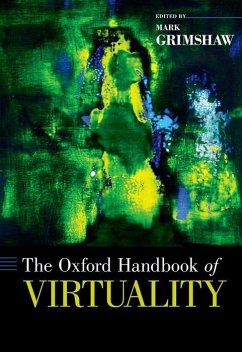The book is a compendium of thinking on virtuality and its relationship to reality from the perspective of a variety of philosophical and applied fields of study. Topics covered include presence, immersion, emotion, ethics, utopias and dystopias, image, sound, literature, AI, law, economics, medical and military applications, religion, and sex.
As this comprehensive and multi-disciplinary anthology makes clear, virtuality has a pedigree that pre-dates the computer age and modern virtual worlds, a pedigree that can be traced back to classical mythology and beyond. Equally, the concept of virtuality is not the province of one field of study alone but is the foundation and driving force of many, both theoretical and applied.
Our conceptualizations and applications of virtuality are multiple, as is shown across the nine sections of the book that move from philosophy to technologies and applications before returning to philosophy again for a discussion of the utopias and dystopias of virtuality. The almost 50 essays contained within range freely across subjects that include the potential of virtuality, ethics, virtuality and self, presence and immersion, virtual emotions, image, sound and literature, computer games,
AI and A-Life, Augmented Reality and Real Virtuality, law and economics, medical and military applications, religion, and cybersex.
Throughout, contributors discuss differences between virtuality, reality, and actuality, in debates filtered through the lenses of the disciplines represented here, and speculate on future directions. It is not at all clear that there are differences and, if such distinctions are to be found, the boundaries between virtuality, reality, and actuality continually shift as ideas, modes of organization, and behaviors constantly flow from one to the other regardless of direction. The Handbook
presents no unified definition of virtuality to comfort the reader, rather a multiplicity of questions and approaches underpinned by provocative statements that should further fuel the debates surrounding our notions of virtuality.
As this comprehensive and multi-disciplinary anthology makes clear, virtuality has a pedigree that pre-dates the computer age and modern virtual worlds, a pedigree that can be traced back to classical mythology and beyond. Equally, the concept of virtuality is not the province of one field of study alone but is the foundation and driving force of many, both theoretical and applied.
Our conceptualizations and applications of virtuality are multiple, as is shown across the nine sections of the book that move from philosophy to technologies and applications before returning to philosophy again for a discussion of the utopias and dystopias of virtuality. The almost 50 essays contained within range freely across subjects that include the potential of virtuality, ethics, virtuality and self, presence and immersion, virtual emotions, image, sound and literature, computer games,
AI and A-Life, Augmented Reality and Real Virtuality, law and economics, medical and military applications, religion, and cybersex.
Throughout, contributors discuss differences between virtuality, reality, and actuality, in debates filtered through the lenses of the disciplines represented here, and speculate on future directions. It is not at all clear that there are differences and, if such distinctions are to be found, the boundaries between virtuality, reality, and actuality continually shift as ideas, modes of organization, and behaviors constantly flow from one to the other regardless of direction. The Handbook
presents no unified definition of virtuality to comfort the reader, rather a multiplicity of questions and approaches underpinned by provocative statements that should further fuel the debates surrounding our notions of virtuality.
